The Text Editor
Vellum’s Text Editor — shown in the middle of the main window — allows you to edit the content of your book. Need to fix a typo, add formatting, or write your entire novel from scratch? You can do it all here.
Editing Text
The Text Editor shows the content for the currently selected chapter. If you need to fix a typo, change some character formatting, or use one of Vellum’s advanced Text Features, you can do it all within the Text Editor:
Vellum’s Text Editor is a full-featured word-processor and includes:
- Spelling and grammar correction
- Smart Quote replacement
- Find and replace
- Text input via dictation
- Text-to-speech to read your content aloud
All of these features are accessible from Vellum’s Edit menu.
Checking Spelling and Grammar
Vellum utilizes your Mac’s built-in spelling and grammar to flag and fix mistakes. Words that Vellum thinks may be misspelled are underlined in red:

If a word is incorrectly flagged as a misspelling, right-click (or Control-click) on it to bring up a context menu. Then, choose Learn Spelling so that you won't be warned about it again, in any document. You can also choose Ignore Spelling if you only want this misspelling to be ignored in the current session.
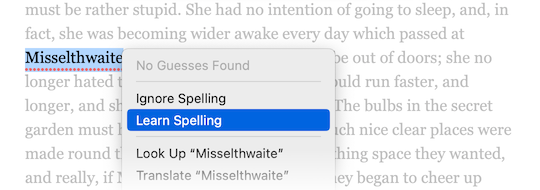
You can also check Spelling and Grammar by going to Edit ▸ Spelling and Grammar ▸ Show Spelling and Grammar:
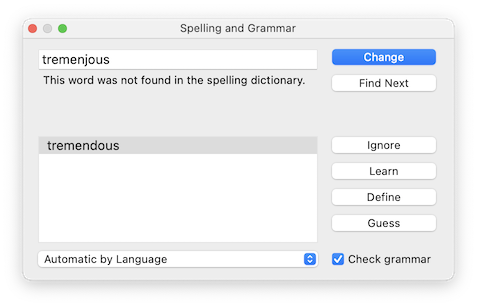
Configuring Spelling and Grammar
To adjust the language used for spell check, go to ▸ System Settings and select the Keyboard pane. There, you can Edit the Input Sources and change your Spelling dictionary.
Note: In macOS versions prior to Ventura, this will be found in the Keyboard section of your Mac’s System Preferences. There, you should see an option for Spelling that allows you to choose a different language.
If you don’t want Vellum to check spelling or grammar, or if you’d rather not use automatic typo correction, you can configure Vellum’s behavior using the Edit ▸ Spelling and Grammar submenu.
Smart Quotes
Professionally typeset books should use “curly” quotations marks, also referred to as typographer’s quotes. When you type quotation marks into the Text Editor, Vellum will replace any straight quotes with the proper, curly quotation marks.
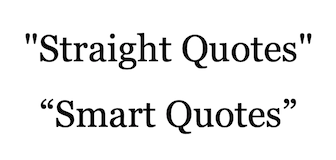
Vellum will import any smart quotes that were used in your original manuscript. If smart quotes weren’t used, select the text with the incorrect quotes and choose Edit ▸ Transformations ▸ Apply Smart Quotes.
Special Characters
Special Characters can be used to fine-tune how words break or to insert symbols not shown on your keyboard. You can find the most common ones in the Edit ▸ Special Characters menu:
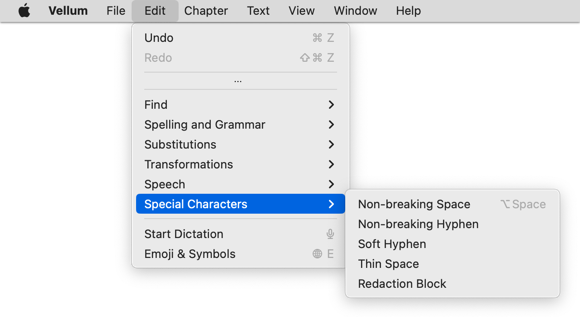
- Non-breaking Space
- Words separated with a Non-breaking Space won’t split across two lines
- Non-breaking Hyphen
- A word with a Non-breaking Hyphen won’t ever split at the hyphen
- Soft Hyphen
- Indicates where a word should be hyphenated, if necessary
- Thin Space
- A narrow space character typically used in non-English typesetting, e.g. after a guillemet in French
- Redaction Block
- A character that can used to indicate that some text has been removed, e.g. “In 19██, Mr. ███████ was 20 years old.”
Special Characters will be shown in the Text Editor as light blue symbols:
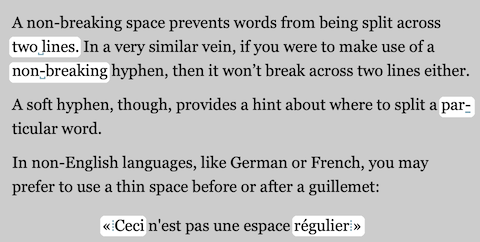
Formatting Controls
Within the Text Editor Toolbar, you’ll find buttons that allow you to add Text Features, apply character formatting, or perform a find operation.

Adding Text Features
The Add Text Feature button can be used to add any of Vellum’s Text Features.
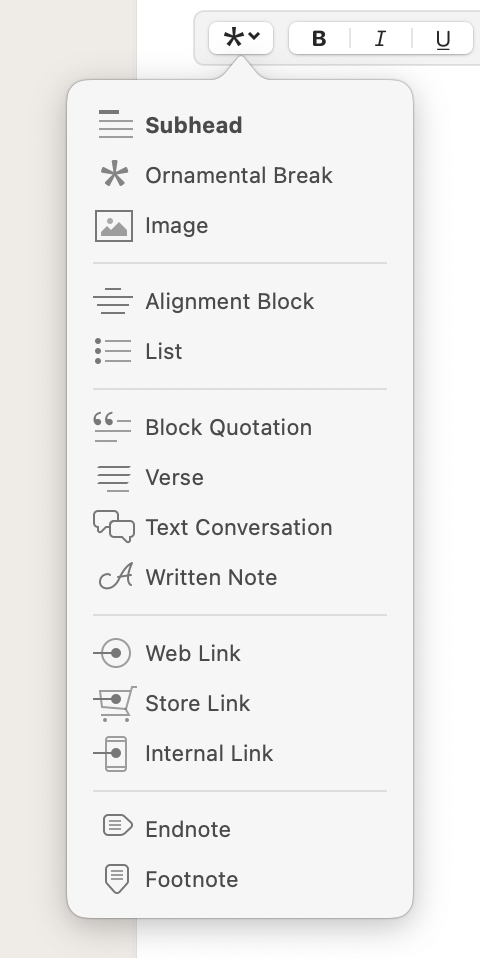
Character Formatting
The bold, italic, and underline toolbar buttons should be familiar from most word-processing programs.

Next to those is a small popup menu that contains other character formatting options, including small caps, monospace, and strikethrough:
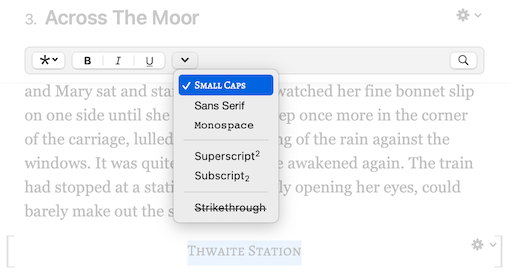
Find and Replace
On the right side of the toolbar is the Find button, indicated by a magnifying glass. Pressing this button will toggle the Find Bar.

The Find Bar allows you to perform powerful search (and replace) operations across all of the text in your book.
Syncing with the Preview
The Text Editor is optimized for ease of editing and therefore does not display the styling that will appear in your finished book. To see that, use Vellum’s Preview.
You can sync the Preview to the Text Editor’s current paragraph by choosing Chapter ▸ Show Current Paragraph in Preview, or by using the ⌘Y hotkey.
Changing the Editor Font
You can customize the font used in the Text Editor, either to switch to a different typeface or to make the text bigger:
To choose a different font, go to Vellum ▸ Settings in the main menu. Then, select the Text Editor tab to view the available controls.
Note: In macOS versions prior to Ventura, this will be found in Vellum ▸ Preferences
The font used in the Text Editor is for editing only and won’t affect your book.
 Vellum Help
Vellum Help